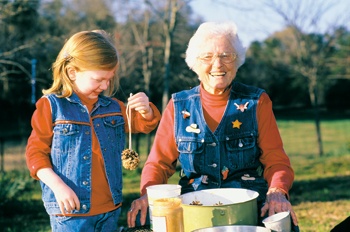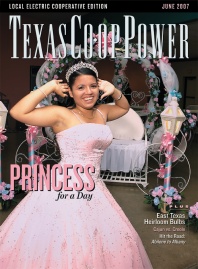Cornie Fletcher, carrying a small tub of plaster of paris, bends toward the ground excitedly scanning for bobcat paw prints. She’s talking the whole time. About her collection of plaster animal tracks, about her Sunday school class, about her flowers and trees, her cardinal with a broken leg, the puppies and dogs abandoned at her gate and, oh, yes, the bobcat that’s been prowling around. She couldn’t be more enthusiastic or animated if she were a nature-loving schoolgirl on a field trip. But Cornie is nearly 88. And she could wear down the Energizer Bunny.
One of Cornie’s greatest joys is introducing children to the natural wonders that surround them—the bugs and birds and blooms that too easily take a backseat to video games, television and iPods. For many years, she taught Sunday school at the Church of Christ near her home in Applebee, just north of Nacogdoches. Her class got used to learning about the Bible right alongside a lesson from the animal kingdom or plant world. She tells the story of a female cardinal she found desperately trying to fly despite a mangled leg. Cornie, a retired registered nurse, named the bird “Claudia Cardinale,” took the little invalid under her wing and hoped to return her to health. But Claudia got too rambunctious and further injured her leg in the wire mesh of her cage. Cornie performed an emergency amputation.
The cardinal inspired Cornie to prepare a lesson about the cycle of life and death and the limits of human control. She brought the ailing Claudia Cardinale to Sunday school. Cornie asked the children to consider whether to keep Claudia alive by any means possible or allow her to die. Cornie’s voice grows soft, “Do you know what they said?” The children unanimously agreed to let the little bird die naturally, exactly the conclusion Cornie had hoped for.
Walking and talking at a pace that leaves others breathless, Cornie, a member of Deep East Texas Electric Cooperative, exclaims the bliss of life in the country. In the wake of her husband’s death 18 years ago, she decided to stay on the farm, rather than accepting her children’s invitations to live with one of them. Sure, there have been some hard times. But Cornie has a saying that puts things in perspective: “You can’t have a good sunset without some clouds.”
You might call her an explorer. There is little that has crossed her path during 88 years that she hasn’t investigated, embraced or mastered. To name a few: nurse, wife, mother, grandmother and great-grandmother, teacher, quilter, businesswoman, gardener, Old Testament scholar, conservationist, naturalist, baker, cook, poet.
Cornie’s homespun poetry—some of it published in the local newspaper—is often inspired by incidents on the farm. She once rescued a fawn that became the subject of “Miss Jockey Deer,” after she wrapped it in a pair of her Jockey-brand sweatpants. Another rescue—this time a bird with its wing tangled in a buttonbush—resulted in “The Restraint,” which recounted Cornie’s conversion of an item of ladies’ undergarment into a restraint to hold the bird still until she could set it free.
About a quarter-mile up a winding dirt road from Cornie’s house is a noticeable hump on the landscape. She believes this is the site of an Indian burial mound. She eagerly leads visitors up the red dirt incline, ably cutting through the brambles and brush, leaving younger visitors in her dust. Back at the house, she has a collection of arrowheads she’s found here, including a very tiny one of which she is especially proud. She delights in sharing the beauty and bounty of her farm with schoolchildren, hunters, fishermen and family. But don’t do anything to threaten the natural order of things. Slight as she is, Cornie is not one to mess with when it comes to respect for the land and its flora and fauna.
But if you behave yourself, you won’t find a friendlier soul in all of East Texas. No sooner than you pass the wooden sign announcing, “Cornie’s Blossom Hill,” you’ll get an invitation for dinner, including homemade bread and boysenberry cobbler, and a nip or two of Cornie’s homemade grape wine.
You’ll get the grand tour of all things bright and blooming, including vines of winter honeysuckle, wisteria, roses, zinnias, gardenias, crape myrtles and apple trees. Garden plots bursting with thousands of wild daffodils, also called “Lent lilies,” have been lovingly propagated from a small clump of bulbs Cornie found decades ago at the site of an old cabin.
Cornie’s own little “cabin” is warm and welcoming, comfortably arranged with furniture and mementos from the Port Arthur home where Cornie and her husband raised their four children. She readily recites the history of everything from the hand-painted heirloom china to the bouquet of feathers in an abandoned wasp’s nest. She’ll open the cedar chest and unfold a multitude of hand-stitched quilts. Each has a story, some joyful and some tinged with sorrow. For every quilt neatly tucked away or displayed on a bed or hanging on a quilt rack, there are many more given as gifts for birthdays, weddings and anniversaries.
But don’t be fooled by all the trappings of domesticity. In 2005, Cornie was named Texas Tree Farmer of the Year by the Texas Forestry Association for her stewardship of a plantation of 200,000 loblolly pines. She’s a successful businesswoman with her eyes on the future. “I’m building a path for the next generation,” she says.
You can be sure Cornie Fletcher’s path for the next generation will be lined with loblolly pines and traveled by the children lucky enough to have learned about nature at the knee of a Texas woman tough as nails with a heart as big as the sky.
Carol Moczygemba is managing editor of Texas Co-op Power.


